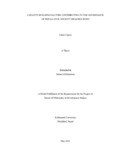
Please use this identifier to cite or link to this item:
https://hdl.handle.net/20.500.14301/391| Title: | Capacity Building Factors Contributing to the Governance of Nepali Civil Society Organizations |
| Authors: | Uprety, Uttam |
| Citation: | Uprety, U.(2024).Capacity building factors contributing to the governance of Nepali civil society organizations. |
| Issue Date: | May-2024 |
| Publisher: | Kathmandu University School of Education |
| School: | SOED |
| Department: | DODE |
| Level: | Ph.D. |
| Program: | PhD in Development Education |
| Abstract: | As a planned intervention, capacity-building intended to improve the performance and governance of civil society organizations (CSOs) becomes meaningful only when it effectively generates individual, organizational, and institutional competence. In this context, various factors – external and internal to the organization – affect the CSOs' performance and governance. With this consideration, this study was conducted among Nepali non-governmental organizations (NGOs) to explore the CSO capacity- building factors contributing to CSOs' governance. It also investigated the differential contribution of those capacity-building factors and attributes of CSO’s chairperson, including their education, on CSO governance. Guided by a post-positivist paradigm/ approach, this study adopted a cross- sectional survey design. The Delphi process was applied from 10 carefully selected Delphi Experts, generating a scale of 80 statements of CSO capacity and governance factors. Three hundred sixty-six respondents completed the survey selected from the population of 1,500 registered NGOs associated with the NGO Federation of Nepal that have email addresses. Using the Exploratory Factor Analysis, the study retained six capacity-building factors and two CSO governance factors comprising 60 out of 80 items that describe CSO governance. CSO capacity-building factors were named: i) Organizational Commitment to Need-based Intervention, ii) Institutionalized Learning Process, iii) Creative Engagement of Staff in Decision-Making, iv) Financial Management, v) Legal Enabling Environment, and vi) Education of Leaders. An enabling environment comprises two factors – the legal enabling environment and the education of CSO leaders. These factors represent both internal and external dimensions. Similarly, the Rule of Law and Informed-decision making were found as two CSO governance factors. Multiple Regression analysis showed that all six capacity-building factors, collectively and individually, positively affect CSO governance with large effect sizes and high statistical power. However, financial management and the creative engagement of staff in decision-making are two significant predictors of CSO governance. In addition, the education of CSO leaders is a significant factor with a positive correlation with CSO governance. Eight factors, identified during this study contributing to the overall good governance and the performance of CSOs will develop a model to be adopted by the NGO Federation of Nepal and the Social Welfare Council. This product will encourage future generations to build on it and review/ refresh it as needed. Study findings will also support policy-making and oversight institutions while developing monitoring tools to review the work of NGOs. CSO’s good governance is core to the overall community development process. Factors building its capacity are core to CSO governance. This study has policy implications for CSOs and donor partners in designing need-based capacity-building interventions and for the government in developing an enabling legal framework for CSOs functioning and further developing the capacity of regulatory authorities. Based on this study's findings, further studies can be expanded by studying the explored factors using Confirmatory factor analysis to confirm a model, conduct longitudinal studies in similar contexts, explore CSO's characteristics related to factors that affect CSO governance, explore reasons behind some factors being insignificant despite attributed contribution to CSO governance. |
| URI: | https://hdl.handle.net/20.500.14301/391 |
| Appears in Collections: | Theses |
Files in This Item:
| File | Description | Size | Format | |
|---|---|---|---|---|
| aUttam thesis_PhD_Final e-copy.pdf | 2.2 MB | Adobe PDF |  View/Open |
Items in DSpace are protected by copyright, with all rights reserved, unless otherwise indicated.